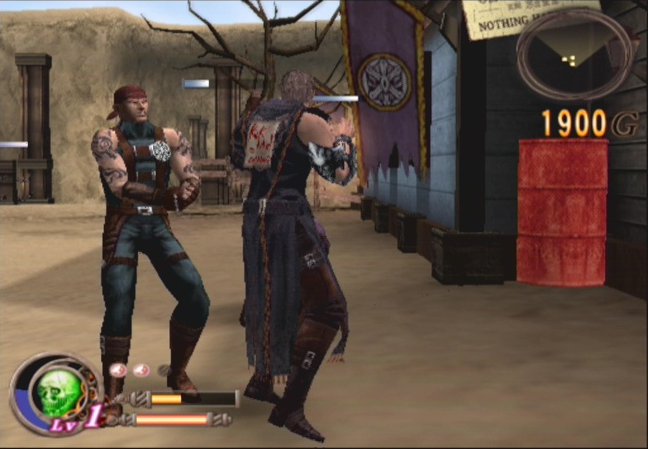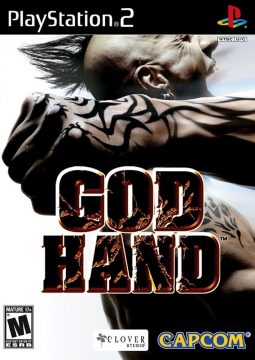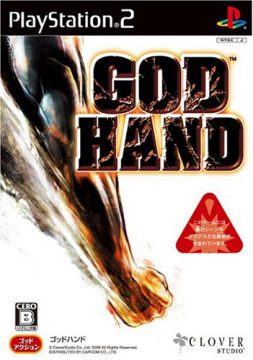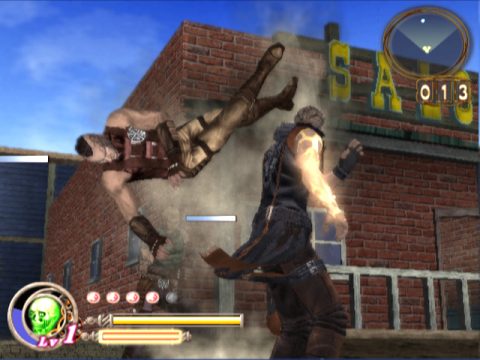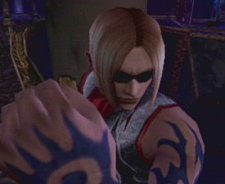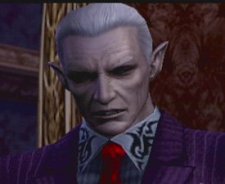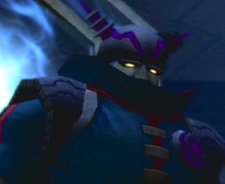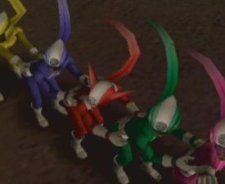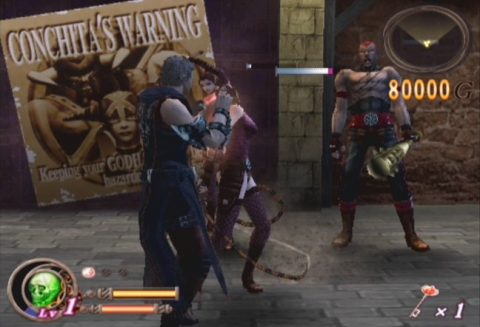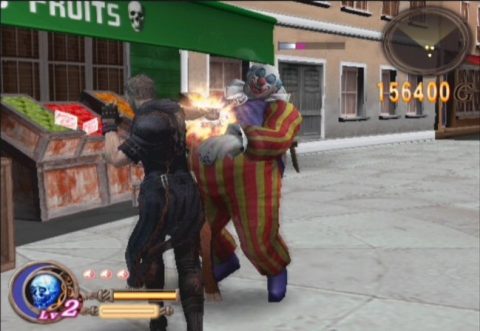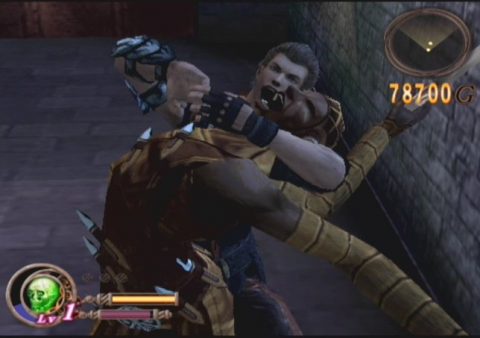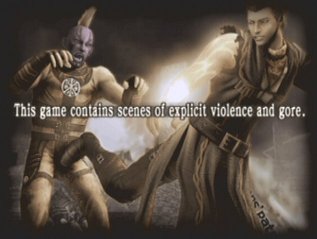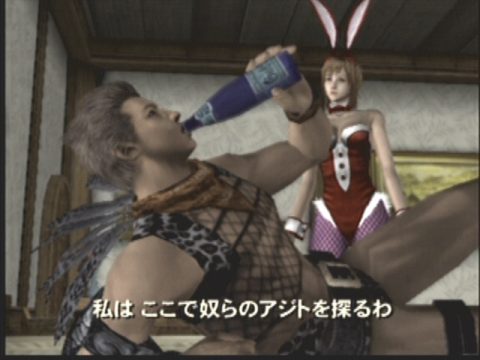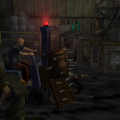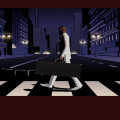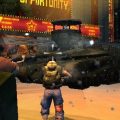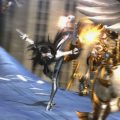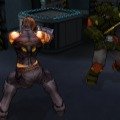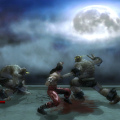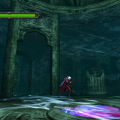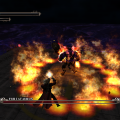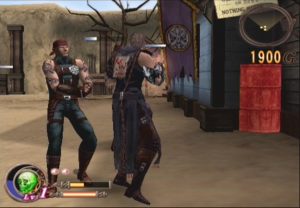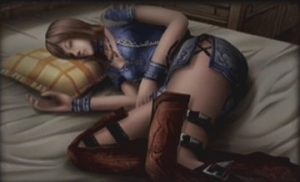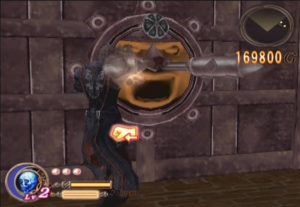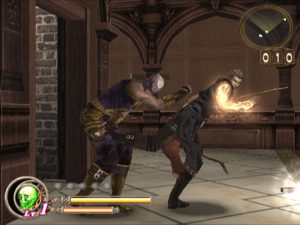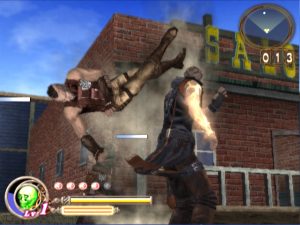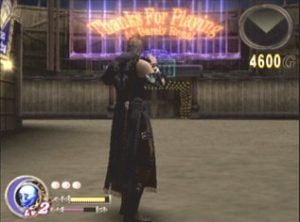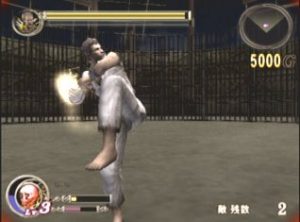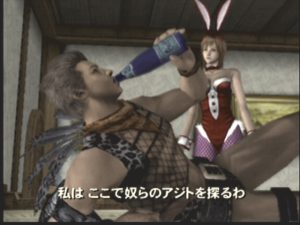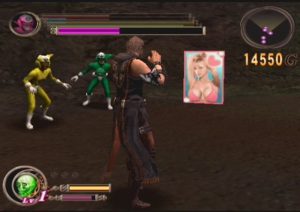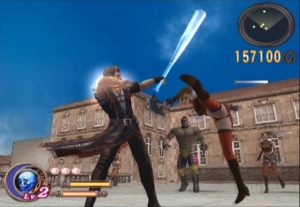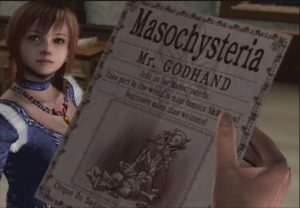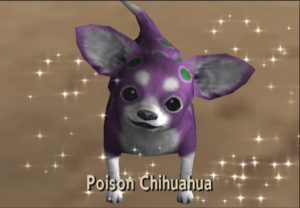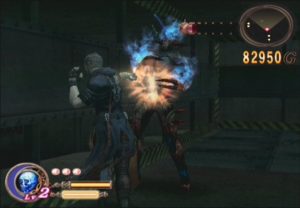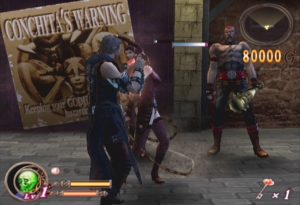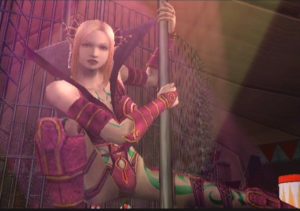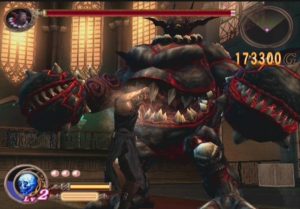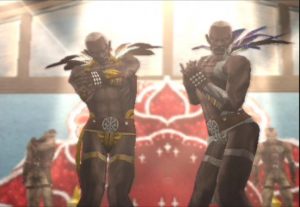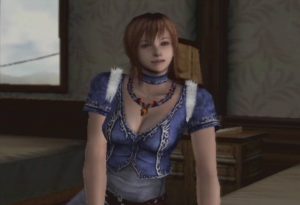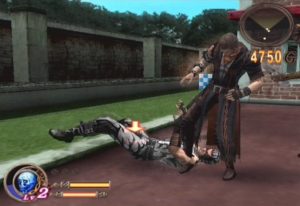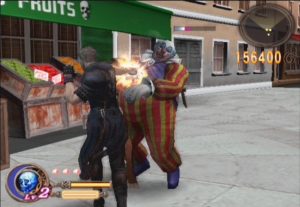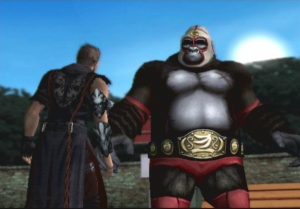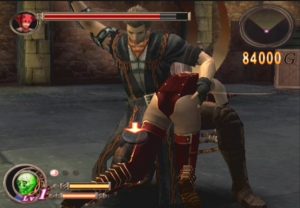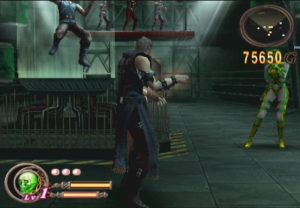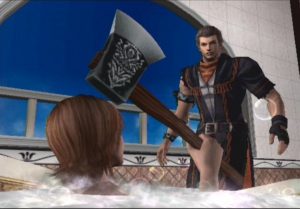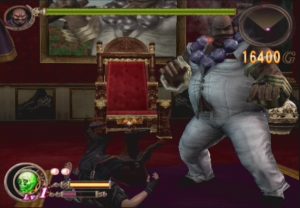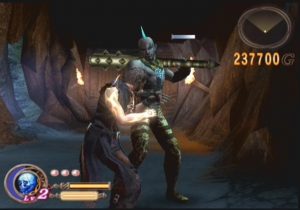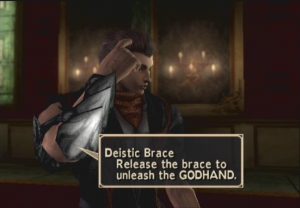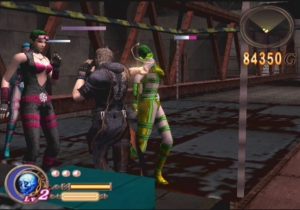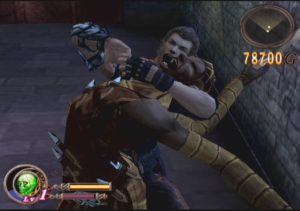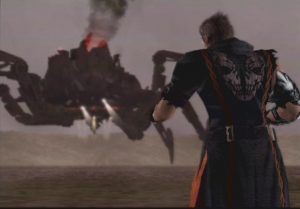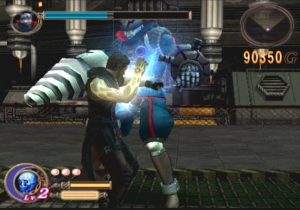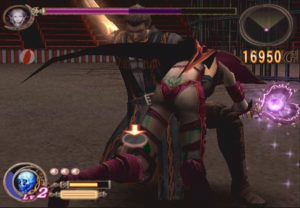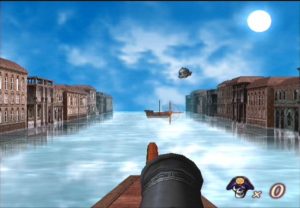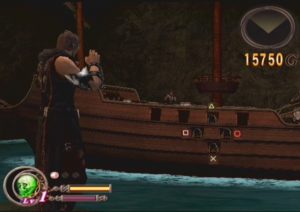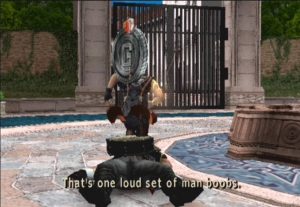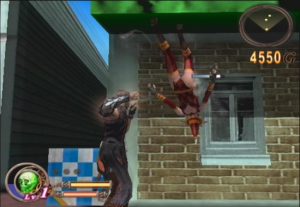Within the first few seconds of booting up God Hand, you know there is something different about it. There are no pre-game cutscenes to fill you in on the story. There is no fancy opening with Japanese-style choreography. There are some company logos, and a silly warning telling you about the non-existent blood and gore you’ll see in the game. You’re taken straight to the main menu, surf rock blasting through your stereo, with only three options and nothing more. Seems rather sloppy and poor, doesn’t it? But it’s at that moment, when you first see the menu, that the whole genius of God Hand hits you.
Did any of the older beat’em ups fill you in on the plot before the action? Nope. You were always taken straight to the main menu, where the only thing you could do was press the start button. Back in the day, that was all the introduction you needed. Stories didn’t matter too much in beat’em ups. You were always given one generic guy after the next, and given a couple of buttons to beat the shit out of him. After beating up the same guy for 5 minutes, a recolored-and-much-larger version of him would come out. Which is exactly what God Hand does. Even after you get past the title screen and start the actual game, the opening cinema forgoes exposition. The plot, it seems, is that there are some guys over there that look kinda bad, so go beat them up.
God Hand is the brain child of Shinji Mikami. After finishing off Resident Evil 4, Mikami moved to Clover Studios. Some people believe his move was due to the Resident Evil 4 Playstation 2 port. Mikami made it no secret that he wasn’t fond of Resident Evil 4 being ported from the GameCube to another system, even going as far as stating he would chop off his own head (fire himself) if it were to happen. After leaving Capcom Production Studio 4, Mikami had a meeting with Atsushi Inaba (Viewtiful Joe, Okami). Mikami brought up the issue to Sushi that action games today were all about weapons and not about fist fighting anymore. Gone were the days where you only had one button, two fists, and five different bad guys to beat down. That was the feeling Mikami wanted to capture.
And thus, God Hand is born. You play the role of Gene, a young man who is damn poor (as he would put it). Gene has a big mouth, but an even bigger heart. That is, until he got the God Hand. Now his heart is a little smaller and his mouth is much bigger. According to a radio tucked away in the game, there are two God Hands. These hands come from a warrior who defeated a demonic race ages ago for the better of mankind. Both of his arms were protected by an ancient tribe for generations, until a man seeking their power married the highest member’s daughter and took off with one of them. The daughter (named Olivia) ran as far away as possible, only to be ambushed by the same demons that were sealed away long ago. Gene attempts to save Olivia, only to be defeated by the demons who slice off one of Gene’s arms. Gene runs as far away as possible, and wakes up in a hotel room with a new arm in place of his stub. The new arm is none other then the second God Hand. Gene must now take down a group of demons called The Four Devas, and prevent them from summoning the demon lord who enslaved mankind centuries ago. Following classic 16-bit story telling style, you would barely know any of this unless you read the manual.
Characters
Gene
Gene is a 23 year old nomad. He comes across Olivia being harassed by some punk ass demons and comes to her rescue. Unfortunately, he finds himself missing one arm after the battle and ends up hiding inside a motel. It is there he acquires the God Hand and takes on the role of our hero. One would think Gene would take this power with responsibility, but he seems to have more fun beating the hell out of people as opposed to saving the day or doing any real good.
Olivia
The 19 year Olivia runs away from trouble and comes across some more trouble. Gene comes to her rescue and bestows upon him the power of God through a new arm. As you progress through the game, you unlock special pictures which can be viewed from the status screen. These are really pointless pictures of Olivia doing various things. Reading books, getting drunk, and bathing.
Azel
The man with the second God Hand. What are his plans? Why did he change to the demon side? The newest (and human) member of the Four Devas, Azel doesn’t seem too trustworthy. Follows your very typical Shinji Mikami cool-villan template he stylized starting with Resident Evil‘s Wesker.
Belze
The head master of the Four Devas, Belze has a habit of wearing bad suits and calling too many meetings amongst him and the Four Devas. He speaks with a hyper-menacing tone and thinks all humans are inferior to demons. In short, he is a real dick.
Elvis
Elvis is a demon who’s basically the comic relief of the Four Devas. He resembles Akuma, if he had stopped practicing karate and just sat around eating junk food all day. He is the first boss of the first level, and (if you understand Spanish) comes off as a crude, obese mexican fellow who has a rather larger potty mouth. He obviously has a thing for Shannon, regardless of her not taking a liking to his jokes or actions. And his favorite food? Humans.
Shannon
Shannon is scantily clad in pink/purple leather and has a thing for making mortal men her slave. She is the only female in the Four Devas. During her boss fight, she shouts out rather suggestive lines of dialog whenever Gene pisses her off or taunts her. After the boss fight, she speaks to Gene like he just finished ramming her up the ass. According to the Japanese translation, you get to see her “naked” later on in the game, which is partially true.
Dr. Ion
Dr. Ion is a toy robot who sits around all day with a charger going through his back. Fighting against Dr. Ion makes you feel like you’re beating the shit out of Mega Man, as every couple of seconds he switches weapons and powers. His voice (transferred through a toy crow) is really gyrating, so both he and Mega Man would get along fine.
Mr. Silver and Mr. Gold
Gold and Silver are the “fabulous” duo who take part in what might just be the funniest boss fight the PS2 generation. When they first meet Gene, they waste no time in admitting to finding him sexy. After a short cutscene and a quiz (“Whats the name of our boss? ELVIS!”), they send their dancing cronies to beat him down. When you take care of their minions, they leap down from a stage and take you on. While Elvis has his signature cigar cannon, and Shannon uses her cane to transform you into a puppy, Gold and Silver prefer to slap and thrust their asses into your face. If they manage to grab you, one will toss you into the air while the other beams down right onto Gene with his elbow.
Ravel and Debussy
Ravel and Debussy are the musical group from Hell. Originally aspiring (and awful) musicians, they sold their souls to the demons in exchange for musical prowess. Using his guitar, Ravel will shoot at you with purple shockwaves and laserbeams, with Debussy smacking against his drum to send out a yellow musical beam that distorts time and space. There also exists an unnamed third to their group, but he is really just a color swap of Ravel.
Evil Trio (Bruce, Conchita and Felix)
While Gene was traveling the world, he came across Bruce and Felix terrorizing Olivia. Gene, being as cocky as he is, tried to take on the demonic duo but found himself missing one arm. With the God Hand now filling in the stub, Gene has found himself being chased once more by Bruce, Felix, and their leader Conchita. You’ll come across these fools two times during your adventure during God Hand, and with the proper skill you’ll find them added to your beatdown count.
Midget 5
These assholes have been watching too many henshin TV shows. They are all named after cards found in a normal deck, and use some of the stupidest puns known to man (“You can find me at the – CLUB!”). What makes them slightly difficult is how they continuously gang up on you. They seem more like a joke enemy than anything, with most of their cutscenes being saddled with ridiculous moments (their signature formation is them, shoving their asses into each other’s crotch area). A little bit of trivia: Killer7 (another Mikami title) featured similar henshin characters.
God Hand‘s dialog is also absolutely amazing. It seems a little strange that a Japanese game like this could have so much American-style humor, but recently we have seen an increase in awesome localizations of foreign games. It should come as a surprise that a lot of the dialog seems ripped from a Saturday night anime that you would catch on Cartoon Network. God Hand features a very natural English script with only a couple of key lines coming off akwardly, and the lines go really well with all the wacky cutscenes. The voice acting is delivered professionally, and features some notable names here and there. You might recognize one voice in the bunch, which is Daran Norris (Team America: World Police, The Fairly OddParents) who plays the role of Belze. Beng Spies (Baten Kaitos, Shin Onimusha) does a great job of making Gene come off as a cocky jerk.
Whenever you pick up any of the power-ups, which include such video game standbys as huge floating fruit, as well as pictures of chicks in bikinis, Gene proclaims “AWESOME!” or “I LOVE IT!” There’s this one fat enemy guy who taunts “What a pain in the bee-hind!”, in a polite manner befitting an English lord. There’s even a Mike Tyson reference as enemies scream “You’re not Alexander!”, alluding to the infamous rant where Tyson taunted Lennox Lewis for not being as strong as Alexander the Great (and threatening to eat his children to boot.) The only downfall to the voice acting is the sparse number of enemy voices. It seems Clover had one guy read off a script of dialog, and merely modified the tone to make his/her voice sound deeper/lighter. This leads to many occasions where you’ll hear the same taunt repeated over and over. At least it has some of the most hilarious death screams ever heard in a video game.
God Hand is also another case where the Japanese version features English voice acting with Japanese subtitles. Right off the bat, you can tell that the Japanese subs are vastly different from the English dialog. One cutscene features a guitar-wielding maniac screaming “Long live the guitar!” with the subtitles stating in english “I LOVE GUITAR!”
There are plenty of other touches that are just subtly absurd. Like the running animation. It’s the same light, silly jog as your walking animation but sped up triple time. Or the weapon whacking animation. Or the kung fu little dance Gene does when he’s standing still. Or the brash “look how awesome I am” pose, complete with taunting laughter, after executing certain powerful moves.
God Hand plays a little differently than other beat’em ups. Since this game is in 3-D, you’d think it would play similar to other 3-D brawlers. Thankfully, it doesn’t. God Hand shares most of its similarities with Resident Evil 4 with a few key tweaks. Gene moves like a tank with the camera directly behind him. Pressing back will cause him to walk backwards, and the only way you can turn him around is by tapping the L1 button. Running is done by double tapping and holding forward, which may sound a lot like the fighting games of today. This in particular is pretty funny, since Gene’s running animation is the same as his walking motion, just sped up to look goofier. It fits with the whole “Benny Hill Kung Fu” thing that God Hand has going. There is no auto-lock, and targetting is done automatically. You have no control over the camera, as the right analog stick is dedicated to dodging left and right, back and down. If you want to get anywhere in the game, you’ll have to learn how to master the dodge-stick mechanic as Gene cannot guard at all. In typical Capcom action game fashion, you have a button dedicated to taunting (which increases the God Hand meter) and another for unleashing the God Hand itself, which acts very much like the Devil Trigger mechanic in Devil May Cry.
Combat gives you three buttons to use. All three of these buttons can be mapped in any way you want. You can map moves and techniques to Square, Triangle, and X. Square has an extra function that the other buttons don’t have, which is the ability to add more than one attack to the button. You can have four punch attacks, four kick attacks, or two punches and two kicks. It doesn’t matter, just any attack can be mapped to that button in successive order. You can buy items to increase the amount of attacks you’re allowed to have on the Square button, items to increase your health, or items to increase your God Hand meter. Healing items must be found in whatever stage you’re playing through and can not be carried in an inventory. As the game progresses, Gene will come across new technique scrolls which will grant him more moves and abilities, and using the cash he collects around the world, he can purchase new scrolls at a shop located in the central hub of the game (titled Barely Regal).
Much like Resident Evil 4, God Hand has a context sensitive button. If an enemy becomes dazed, you can press the circle button to perform all kinds of actions. For heavier set characters, you can use a move called the Stinger. For thinner characters, you can suplex them headfirst through the ground or punch them rapidly until they collapse. Unlike Resident Evil 4, all these actions will put you into a circle mashing game. Mashing a single button has never been this fun in any other game out there, because it causes action to speed up to absurd velocities. It’s ridiculous how fun it is, really, and all moves end in a humorous fashion. For thinner characters, they’ll get their head stuck into the ground when they are suplexed near death, or sent across the screen if they fall victim to Gene’s fist. Gene pulls some wrestling moves on the bigger guys, and all female girls will be spanked on the ass until they are knocked around the world.
God Hand has a long lasting value to it, mostly because of its fun and addictive challenge. Depending on how well you do, a “level” bar will go up and down. Level 1 is the lowest, and the highest is called “Level DIE” typed with a bright red font. Between Level 2 and 3, the game remains at a fair level. Enemies aren’t crazy hard, aren’t super fast, nor are they mega powerful. You’ll more than likely find yourself having a much more enjoyable time at this level. When the level hits DIE, is when the game’s difficulty falls apart. It’s right at that moment where the enemies become unfair and dull to fight. They get faster and stronger attacks, with some just downright unfair. The game has a radar in the top right of the screen that helps you take note of where all enemies are to make up for the lack of a moving camera, but the radar fails to tell you when the enemy is charging to attack or what attack they’re using specifically. This leads to moments where an enemy will use an attack that not only has the range of half the stage, but also enough power to take down half of your health. It’s amazingly unbalanced, but once you get used to the increased speed of your foes you’ll have a much better time clearing out areas of enemies. Still, the level system is deeply flawed and doesn’t exactly go up based on skill, but how many punches you are landing and how much damage you’re dealing. If you choose the Hard mode of difficulty, then you must play through the entire game on Level DIE.
Boss battles are very similar to your standard enemy fights. It’s just that they have a much bigger health bar, more stronger attacks, and a load of tactics. The first few bosses you encounter in the game are Mr. Gold and Mr. Silver. The fight is so genius and fresh from your typical boss bout, you can only hope for more interesting opponents. The other bosses fail to match the genius of the Q&A fight, but they do provide a challenge and a nice break from the action. One fight features Gene against Elvis who shoots fireballs from his cigar, and another has Gene taking down Shannon who can turn him into a puppy (with its own moveset and animations).
However, if you’re not into old school gameplay, God Hand can get pretty frustrating pretty quickly. Whenever you kill a bad guy, there’s a chance that a demon soul will rise from their dead bodies and take you on. These nasties are tough, and their presence is denoted with a darkened landscape and a dissonant soundtrack. They’re massively powerful and can teleport quickly, making them quite the challenge. Still, as long as you’re persistent and you get into your groove (learn to dodge attacks and use guard breakers) and you’ll do pretty well.
God Hand introduces a mechanic called the God Roulette/God Reel into combat. Tap R1, and a list of moves will drop down for you to choose from. Using the reels at first is a little awkward. You flick the analog stick/tap R1 to scroll through the list of moves, and press X or Circle to make a selection. You can only move down the list of moves, and the ability to scroll back up is not available. Some of these moves are rather simple. Some have Gene unleash a crazy amount of punches, some a crazy amount of kicks. But a good deal of them are just “out there” crazy. Never before has a game allowed you to kick someone into the stratosphere. If the enemy you kick high into the sky has a low amount of health, they are gone for good, signaled by a sparkle in the distance. If your target has a small dash of health after the kick, they’ll simply fall straight back to planet Earth. The effect is amazingly cool, and doesn’t seem to wear out its welcome even after you’ve seen it fifty times over. Other notable moves include one where Gene knocks the enemy into the air, and turns them into fireworks, and another where Gene summons a baseball bat from the heavens and scores a homerun swing on his foes. It’s all quite hilarious. There are plenty of other neat touches too, such as the map screen inbetween levels, which features a 2D animation of Gene running at the bottom, paying homage to Simon Belmont in the original Castlevania.
There are also a handful of strange minigames, including a Chihuahua race, a button-memorization game where you need to reflect cannonballs back at an attacking ship, and a shooting gallery where you need to take down ghost pirates, as well as an occasional Space Invaders-esque UFO. Some of these games are punctuated with classic 8-bit style music and sound effects. The developers obviously have a great love for video games, which is one of the main reasons why God Hand turned out so excellently.
God Hand is a rare occasion as an action game. It features no real New Game+. There is a mode which allows you to continue the game on your completed file, but instead of giving you all your attacks and reels, you must buy them all over again. New attacks are available from the shop, and a battle arena is completely unlocked with no caps on how far you can go through its list of challenges. You also get more money bonuses as well. Three costumes are available for Gene to dress up in, including the same outfit as Gold and Silver, and an outfit that bears a strong resemblance to Ryu’s Gi from Street Fighter.
God Hand is like a mid 80s arcade game brought up to vaguely current standards, except it’s actually somewhat self conscious of how ridiculous the whole concept is. The result is one of the freshest video games released in a long time, which was essentially the point of the now-defunct Clover Studios.
When brought across the sea, several changes were made to the game to prevent confusion. The most minor change is the renaming of the God Reel, now called God Roulette. One item in the game called Chihuahua Curry was changed to Puppy Pizza. Curry is a popular delicacy in Japan, while here in America it is relatively unknown. Another change includes the removal and addition of a new attack. In the Japanese version, Gene had a pan technique he could use from the God Reel. For a small bit of damage, a pan will fall from the sky and knock Gene on the head, granting him invincibility for a couple of seconds. Why this was removed is beyond me. Maybe it was the sense of humor, maybe it was because in super plays, people were abusing it. But then again, the whole reason anybody would use this technique was to sacrifice a small bit of health for invincibility. Instead, we got a new move called Head Slicer. The only thing special about this move is its ability to remove an enemy’s head. No blood, only a decapitation that works randomly. And the head goes flying into the air, literally. Had they kept the pan in, the game would probably have been dropped to a Teen rating as opposed to Mature. The Head Slicer move was probably pulled from the list in Japan due to the CERO rating board not taking too kindly to decapitations in games (as was the case with the heavy censorship for Biohazard 4). It does a small amount of damage, and for 8000 gold you can get better attacks.
Other changes include signs found throughout the game. Rord’s Pub was changed into Beating A Dead Horse Pub for obvious reasons. Why they made this change but kept Barely Regal is a mystery. The ending Credits were also changed too, now featuring English lyrics sung by a member of Panda, No Panda. To put it short, the singer sounds awful and ruins the song’s lyrics, although at least you can understand them.
Japanese gamers also got lucky. By purchasing the first print of God Hand, you would receive a soundtrack CD featuring several musical selections by composer Masafumi Takada. Takada has done scores for Killer7 and most other GHM projects. His score for God Hand is beyond brilliant. From Gene’s Rock-A-Bye, to the Ending song, if you are looking to buy any game soundtrack this year, make it GOD TRACKS. The English version features no bonus soundtrack CD. Only a shitty black and white manual. The cover art is BRILLIANT, though. It’s definitely one of the few scenarios where we Americans got the better artwork for our covers. The original art featured a man’s arm going through a tattooed thugs mouth, which was used in advertising materials but apparently Capcom censored and just had the fist punching the face. The game debuted at retail at a mere 30 bucks. That is the definition of bargain right there.
In Japan, God Hand was a rather anticipated title. It was on Famitsu’s Top 10 Reader’s Most Wanted for some time, but unfortunately received low scores. Just like every other Famitsu review, they ran on how the game was too difficult, the enemy variety was not enough, and the graphics were bland within a small review space. You can’t help but think that if the game had the words “Final” and “Fantasy” in them, it might have done better score wise regardless of quality, as Famitsu proved with their hilarious review of Dirge of Cerebus. God Hand appeared in the top 10 list for the month of September 11-17 in Japan at number 5 (according to GameSpot), and was also introduced under the CapKore collection at the budget price of about 30 bucks (it was originally released at full retail price in Japan).
Reviews and sales in the US were a different matter. How many copies God Hand sold is unknown at this point (it didn’t appear on the top sellers list), but the review scores have remained at an average of 70% (according to MetaCritic). One review had the gaming community over on its head. Of course, the review came from IGN. IGN goes on about issues in the game that are flat out hilarious. Bad camera, lame sense of humor, bland graphics. You can’t help but think that maybe they spent a couple of hours with the title before reviewing it. At this point in the gaming world, graphics shouldn’t matter unless they’re so good it adds to the game (Gears of War), or so bad and shoddy it detracts from the overall experience (most Ubisoft ports). The camera isn’t the best, but at all times there is a radar on the screen which shows you were the enemy is so they can’t exactly sneak up on you (only cheap hits). GamePro’s review was just as bad, regardless that the score was more fair and a lot higher. GamePro once again comes to the rescue with their hilarious PRO-TIPS (yes, it’s written all in CAPS). One tip claims that you shouldn’t use your God Hand power right when the bar reaches max. Another tells you that stomping on your foes is a good way to deal damage. Preserving your God Hand should be obvious the first time you use it, and stomping on your foe is the most worthless attack in the entire game and leaves you open.
The fate of Gene and Olivia is revealed at the end of the game, but the fate of God Hand’s impact lives on as a cult classic. Clover Studios went under, but reformed a PlatniumGames, where the combination of intense action and over-the-top goofiness lives on titles like Bayonetta, MadWorld, and Metal Gear Rising: Revengence.
